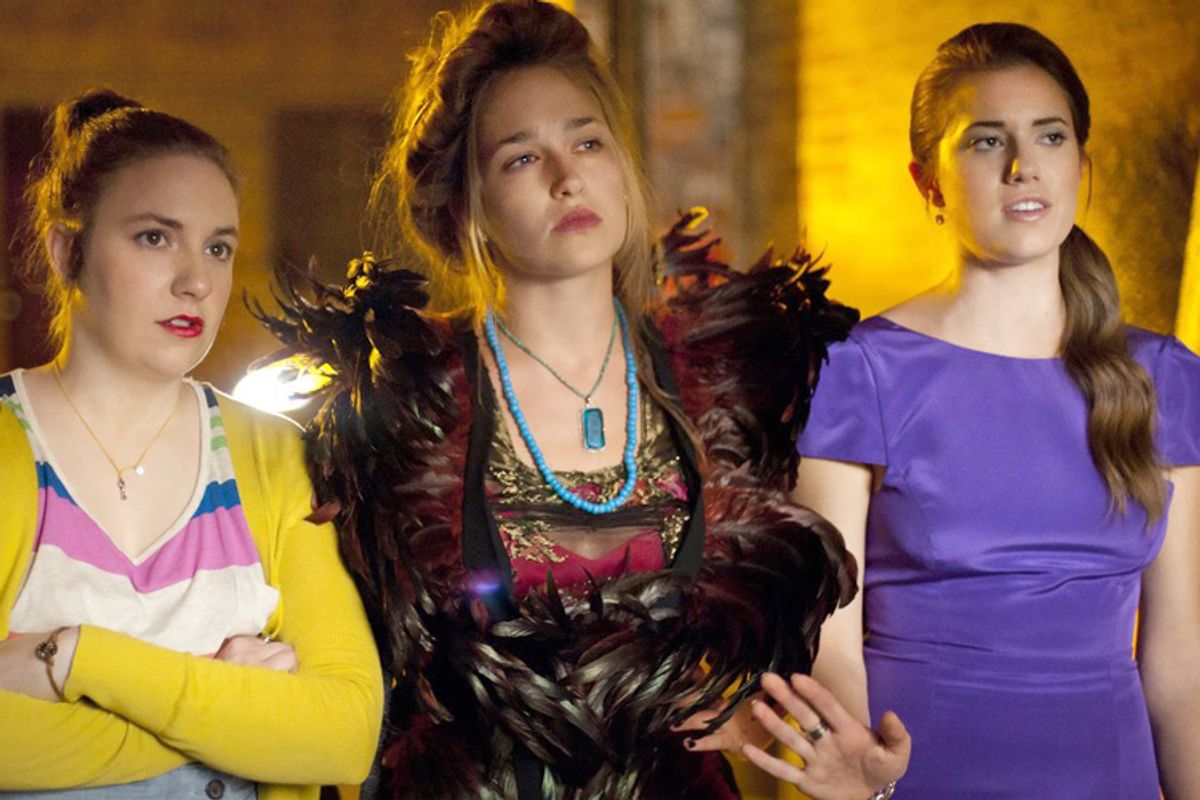“It was really well-written!”
This is the damning charge leveled at Hannah's essay in this second installment of our second season — tragically, by Sandy, the perfect partner who we now learn is less-than-perfectly attentive and, perhaps consequently, a Republican. After a season of fighting for self-expression, Hannah and her girlfriends have learned that self-expression is wonderful, until someone actually notices what you're expressing.
Sandy saying that Hannah's essay “isn't for me,” that damn lacking even faint praise, is the least of it. Marnie, out on the job market, finds her Ann Taylor suits and Revlon-ready features are a complete liability in the art world. (“Where do you ... get a suit like that?” one job interviewer asks.) Jessa's artistry has been entirely stymied by her new, emotionally fulfilling life. (“I'm not used to painting someone I love,” she tells her shirtless, posing husband.) And, unfortunately, Hannah's “open dialogue” with Sandy about her writing quickly spreads into an open dialogue about how they actually see each other. When Hannah decides their political differences are too vast a crevasse for her to bridge, Sandy tells she's the typical white girl who moves to the city and decides to date a black guy. (Finger quotes.) Hannah flies back with the familiar-sounding,“It's ironic, because I never thought about the fact that you were black. I don't live in a world with divisions like that.”
Ah, but you do, Hannah, you do — and noticing other people are black is the least of it! The terrible thing about getting noticed, it seems, is that you don't get to choose what people notice. Elijah confesses sleeping with Marnie to his boyfriend George, thinking his confession is enough. (“It was like three pumps! Two and a half pumps!”) But the sweep of Elijah's color-coordinated closet across the room is not gay enough, for George, to counter even one pump. Marnie asks a prospective employer plaintively: “How do you see me?”, unable to decide for herself. The woman cocks her head and responds, “I don't think I see you ... in New York.”
Apparently, what you reveal to the world makes things happen, whether it's a diary your BFF's boyfriend reads or a face that seems more suited to a Gap greeter than a gallery. That's why, while the previous show took place primarily in the buff, this episode takes place mostly on screens, as when Adam sends Hannah an entire hate-album of songs directed at her. (It's heralded by the emo plucking that lesser directors use to impart emotion. Dunham alert: We are all our worst directors.) “Oh, look — he's so scary, with all his tools behind him!” Elijah says before slamming Hannah's Mac on Adam's face. Aren't we all.
An august critic recently was kind enough to warn Dunham that her current success would soon make it impossible for her to continue thinking of new and paralyzing humiliations for her character. (That same trouble dogged the reclusive Emily Dickinson, whose poems turned increasingly to wallpaper, thus inspiring Charlotte Perkins Gilman's book on same.)
But this suggests that "Girls" somehow works on some sort of a seven-second delay of Dunham's real-time life, as raggedly imitative as the bangs Hannah cuts this show while watching a how-to on YouTube. But fear not, critic. Dunham, whose show is about the meta-dialogue of the self-defining tweet generation, is not, in fact, actually transcribing the script straight from her iPhone.
In fact, Dunham is already engaging with her viewers in, as she puts it to Sandy, a very funny “open dialogue” about her work. First, Sandy himself, like a mass Siri request, sprang into being. Then Hannah mouthed to him, both in affection and condemnation, the race conversation the entire critical community had about the first season. And I think I might have heard Sandy's critique of Hannah's essay — “I just didn't feel like anything in it. Nothing was happening. Ultimately it just felt like waiting in line and all the nonsense that goes through your brain” in a few thousand reviews of the show itself.
But Dunham is, it seems, undeterred. “Give me notes!” her character says, and we do.
And this meta-dialogue on the perils of expression, this show, takes place across all the characters. Marnie may be telling every that her job as a club hostess is great for interpersonal relationships, but her costume — get it? Costume? — still makes her look like, as Elijah puts it, a “slutty von Trapp.” Yes, yes, the show is also a device to talk about how devices define this generation — as when Elijah says that George isn't talking to him because he “hasn't responded to any of my Facebook messages or my texts.” But don't miss the forest for the tweets.
Dunham shows she's most alert to the risks of putting it all out there in the scene when Adam surprises Hannah by using his key to her apartment. Hannah texts 911, then is taken aback that the cops actually show up, apparently needing to now file a real-life report. (Adam never even responded to her texts!) Worse, the cops check their BlackBerries, and find out Adam actually has two unpaid parking tickets and an unanswered summons for public urination. He's got to go to jail. Too bad they didn't pull up his YouTube videos instead.
Dunham obviously wrote this season before she won at the Golden Globes where, if we hadn't noticed, she cut her hair. (Maybe it was to assure that critic she's going to “grow creatively.”) If we didn't know before, we should be cottoning on that Dunham is not simply feeding her insecurity directly into Hannah like a depleting cache of Powerbars. “It's so great what you do with what you have!” Jessa's husband tells her. I agree, and I get it: We all use our lives for material. She's talking to critics about it. Too bad some are already calling 911.



Shares